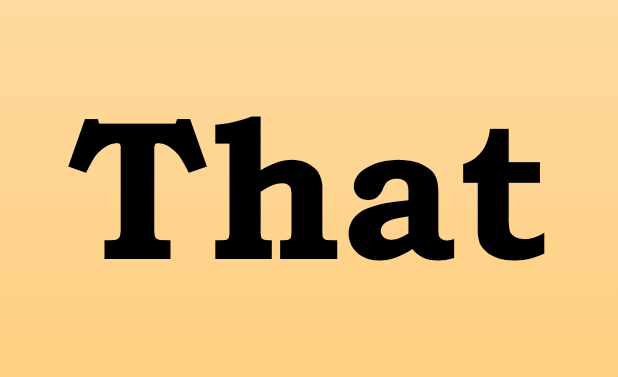Narrative:
When we first learned English we associated the word that as an opposite to this. “that apple”, “that toy”, “that man”, anything that was not “this.” It indicated something or someone that was somewhat away from where you were. Simple, till now. But the bigger use of this word now is as a connector, or conjunctive elaborating on a statement.
‘that’ is a very popular connector of different parts of a sentence but is also governed by two other rules:
1. There are places where the usage of the word is an optional add-on
2. There are places where its usage is incorrect.
First let us look at a few sentences with correct usage:
1. It is true to say that the world is round in shape (Here “that” specifies what is true to say)
2. Did you know that I am from India? (Here “that” specifies what the speaker wants us to know)
3. I am not at all surprised that you want to speak to me (Here “that” specifies the reason for no surprise)
4. I am trying to come to terms with the fact that I am no longer healthy (“that’ specifies again what the speaker is coming to terms with)
5. It is a testament to my patience that I am still friends with Michael. (Here “that” specifies the justification for my patience)
Now, look at optional usage:
1. I really believe that I am the best at Chess (In this instance, “I really believe I am the best at chess” would also work)
2. It so happens that I have no reason to regret my decision (Here, “It so happens I have no reason to regret my decision” will also work)
3. My own feeling is that it was a mistake (In this case, instead of “that’ you could have just put a comma like “My own feeling is, it was a mistake”)
4. Please understand that your consent is not necessary (Here “Please understand, your consent is not necessary” will also work).
Wrong usage of the word:
1. As you know, that Donald Trump lost the election (The first word “As” means that the word “that” becomes irrelevant. If you said “You know that Donald Trump lost the election” it would be correct)
2. Needless to say that I will not be attending this meeting. (“Needless to say, I will not be attending that meeting” is the right way to say it)
The vagaries of the English language continue………

